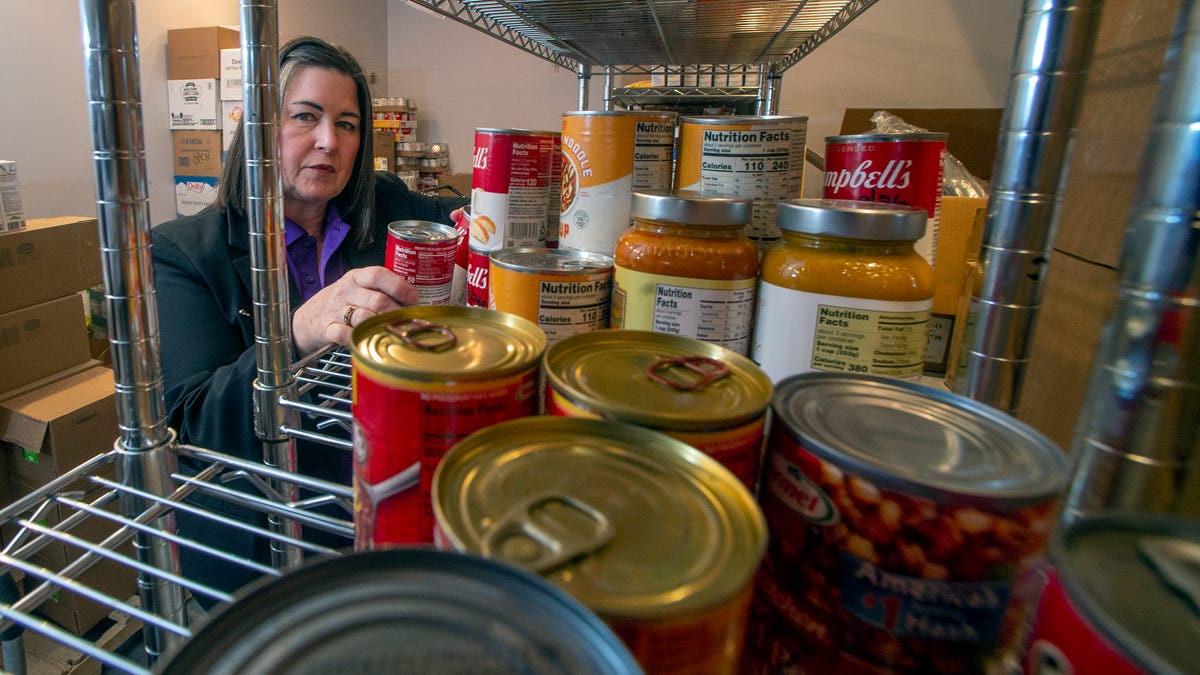FRAMINGHAM — “Canceled.”
That’s the dreaded word Jean McMurray, executive director of the Worcester County Food Bank in Shrewsbury, saw next to her most recent online order she had made.
Last week, the U.S. Department of Agriculture (USDA) Northeast Regional Office confirmed to the state’s Department of Elementary and Secondary Education (DESE) that Massachusetts’ $3.4 million allocation from the Emergency Food Assistance Program (TEFAP) had been canceled. The funding would have provided 121,830 cases of pre-selected food items such as eggs, chicken and milk to Massachusetts food banks — and help feed residents.
Other types of food affected included fruit, pasta, beans and salmon.
“Why does President Trump keep taking away food from our children and families?” Gov. Maura Healey asked in a press release sent out on Friday afternoon. “Massachusetts food banks do incredible work to make sure local families have access to nutritious food, which promotes food security, reduces medical costs and supports the economy. Additionally, the TEFAP program connects students with local, healthy food while also supporting farmers and local business.”
Mass. food banks scramble after USDA funding cuts
Greater Boston Food Bank CEO Catherine D’Amato said the organization is already facing increased demand for nutritious food across its network of 600 food pantries.
“Over 600,000 people per month come to them for help,” she said in a statement. “The cancelations of federal commodities will reduce food throughout our region, making it more difficult for food-insecure people to feed themselves and their families. GBFB will need to raise money to replace and purchase this healthy food that our neighbors so desperately need.”
One of these food pantries includes Daniel’s Table in Framingham.
Executive Director Sandra Montesino said the pantry gets some of its food from regional food banks.
“We’re funded through grants from foundations, local banks, we have corporate donations and individual donations,” she said. “However, we are indirectly impacted by the federal funding cuts. The way food and security infrastructure works is that the larger regional food banks, which do receive federal funding, most often distribute food to partner agencies like Daniel’s Table.”
Franklin, Milford pantries also affected by reduced supplies
The Franklin Food Pantry also receives food from the Greater Boston Food Bank. In an email to the Daily News before the funding cuts were announced, Executive Director Tina Powderly said such a move would affect the pantry’s food supply.
“If these funds are cut, many pantries will be challenged to access nutritious food for their communities,” she said in the email. “We also recognize that cuts to the Northeast Food for Schools (NFS) program will impact our partners’ (including local farms and Franklin Public Schools) ability to provide nutritious food for children and families.”
McMurray said the Worcester County Food Bank has experienced a 30% increase in people needing services.
“The food that we receive form the USDA, we distribute that out to our network of food pantries and we support about 100 food pantries all throughout Worcester County,” she said.
In Milford, the Worcester County Food Bank supports both Daily Bread Food Pantry on Exchange Street and the food pantry at the Salvation Army on Congress Street.
“It definitely means less food on their tables,” McMurray said. “We cannot fill the gap created by any reduction in federal food support, so it definitely translates into less food on the tables of our neighbors.”
Patrick Leahy school program has been canceled for fiscal 2025
DESE also received notice from the USDA that the Patrick Leahy Farm to School State Agency Grant Program has been canceled for fiscal 2025. DESE had applied for $384,446 in funding for the FY25 grant. There was no reason given for the cancellation, according to the governor’s office.
The cancellation of the Patrick Leahy Farm to School grant program and TEFAP, coupled with the termination of the Northeast Food for Schools and Local Food Purchase Assistance Cooperative Agreement programs, “has a cascading impact across the local food system,” said Department of Agricultural Resources Commissioner Ashley Randle in a statement. “Family farms, students and food-insecure individuals are negatively impacted by these funding reductions and the opportunity for students to access nutritious, locally grown food becomes more difficult.”
“To me, it’s just unconscionable that they would take food away from people who are struggling,” McMurray said.







